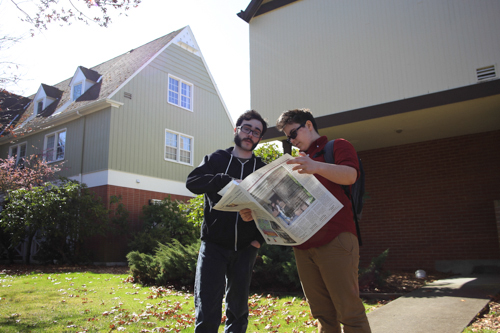Oracle PeopleSoft is a software upgrade meant to optimize the heavy traffic and growth of Puget Sound’s modern needs. The program, however, has had negative feedback from students, especially when registering for classes for the upcoming semester.
“Conversion to PeopleSoft is an enormous undertaking, and it is definitely valid to ask why we are doing this,” said the Technology Services page that discussed the transfer. The page had been following the course of PeopleSoft’s integration since it became part of campus in the spring of 2013.
Prior to this upgrade, students had been using the service called Cascade for tasks such as registering for classes or logging job hours. Cascade is still used for some services like vehicle registration and viewing grades from previous years, but PeopleSoft has taken over some of Cascade’s major tasks.
“It was my experience before we switched to PeopleSoft that I would go on and log my hours, and it was a very simple process,” sophomore Arthur Hogan said. “With PeopleSoft, it’s easy to neglect to put up your hours just because of the hassle that is entailed by going through it. You have to click through five or six tabs just to get to your timesheet.”
Sophomore Hermosillo Torres has experienced registration through both Cascade and PeopleSoft. “[Cascade] was very easy to navigate, very straightforward…I think that the problem here is that PeopleSoft…is a little bit crowded, a little bit less streamlined,” Torres said.
A change which has been more positively recognized is the Shopping Cart system. Students choose their classes for the next semester and put them in one location prior to registration, then sign up for all of them when the time comes. Getting to the classes and finding what you need, however, is slightly less manageable.
Elizabeth King, also a sophomore, signed up for an art class that was cancelled over the summer, and was never contacted about the cancellation. This problem could easily be attributed to communication issues between the registrar and the PeopleSoft technology, but the error was still aggravating for all involved.
“[This kind of mistake] decreases the trust we have in the registrar,” King said. “If you register for this class and it says, ‘yes, you’re in it,’ one should assume you get to take the class…It’s an unnecessary step that we’re forced to take.”
“Registering last year, I couldn’t actually get a fourth class. It was physically impossible. I went down to the registrar and they tried to turn me away. I told the person at the desk: ‘No.’ I told her that I was going to see her supervisor, and I was going to get the class that I needed, because I go to this school and pay for it,” Hogan said.
The tedious nature of PeopleSoft’s registration process has been a common complaint among the Puget Sound student body.
A new interface and navigation have led to the simple problem of convenience: Users of PeopleSoft take longer to accomplish tasks because of its layout.
“With my academic advisor specifically…he was trying to help me figure out what requirements I had left for my degree because I’m a senior in my last semester,” Christine Anderson said.
“PeopleSoft is an outdated system that we switched to because it’s cheap,” Hogan said. “It’s a decade old. There’s no reason… It is unjustifiable, in fact, for us to be using this system. It’s not a convenient or well running system. As long as we have it, people are going to feel inconvenienced.”
Improved conditions for the services offered at Puget Sound can only be made through communication between students and faculty.
Any problems or questions regarding PeopleSoft or technological progress in general can increase the chance for an intuitive system for all members of the University.



